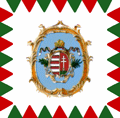
3/17/2017 - The American Hungarian Federation's annual commemoration of Hungarian National Day and the anniversary of its historic 1848 democratic revolution led by Louis Kossuth for 2017 was held at the Hungarian Embassy in Washington, DC. In keeping with tradition, the Hungarian Scouts of Washington led the audience in patriotic performance and song. The keynote addresses were provided by Deputy State Secretary Dr. Péter Szilágyi and AHF Chairman Frank Koszorus, Jr.
Mr. Koszorus remarks are below and available for [download]:
Is Commemorating Kossuth Relevant At All?
On the occasion of the American Hungarian Federation’s and co-sponsoring organization’s commemoration of March 15, 1848 hosted by the Embassy of Hungary
Washington, D.C. March 11, 2017
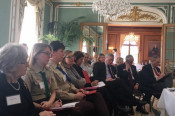 Your Excellency, Mr. Deputy State Secretary, Distinguished Guests, Dear Friends: Your Excellency, Mr. Deputy State Secretary, Distinguished Guests, Dear Friends:
We come to the part of the program when we switch to English so that those who are not completely fluent in Hungarian can participate in our commemoration of Hungary’s democratic revolution and war independence of 1848 - 1849.
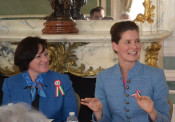 I would like to thank Ambassador Szemerkenyi for hosting this wonderful and timely event. I also thank you my fellow Hungarian Americans for joining us this afternoon as this community and the American Hungarian Federation have done so for decades to commemorate this singularly important period of Hungary’s history. By participating you are continuing a tradition that extends back to Lajos Kossuth’s highly acclaimed trip to the United States from December 4, 1851 until July 14, 1852. I would like to thank Ambassador Szemerkenyi for hosting this wonderful and timely event. I also thank you my fellow Hungarian Americans for joining us this afternoon as this community and the American Hungarian Federation have done so for decades to commemorate this singularly important period of Hungary’s history. By participating you are continuing a tradition that extends back to Lajos Kossuth’s highly acclaimed trip to the United States from December 4, 1851 until July 14, 1852.
Kossuth was only the second non-American to address the United States Senate and the House of Representatives, the first being the Marquis de Lafayette.
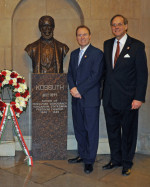 I would be remiss if I failed to mention that it was the American Hungarian Federation that commissioned the bust of Kossuth and presented it to the American people for placement in our nation’s Capitol. I would be remiss if I failed to mention that it was the American Hungarian Federation that commissioned the bust of Kossuth and presented it to the American people for placement in our nation’s Capitol.
From the moment he set foot on American soil, Kossuth was enthusiastically received. His reception in New York was only equaled by the reception that had earlier greeted George Washington and Lafayette.
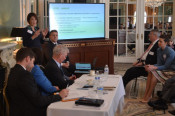 During his extended tour of the United States, Kossuth delivered more than 300 public addresses and lectures, including his famous speech in which he stated, “All for the people and all by the people. Nothing about the people without the people. That is Democracy, and that is the ruling tendency of the spirit of our age.” These words were uttered by Kossuth over a decade before President Abraham Lincoln's famed “for the people, by the people” speech given at Gettysburg in 1863. During his extended tour of the United States, Kossuth delivered more than 300 public addresses and lectures, including his famous speech in which he stated, “All for the people and all by the people. Nothing about the people without the people. That is Democracy, and that is the ruling tendency of the spirit of our age.” These words were uttered by Kossuth over a decade before President Abraham Lincoln's famed “for the people, by the people” speech given at Gettysburg in 1863.
Lincoln, who met with Kossuth, eloquently referred to Kossuth, as the “most worthy and distinguished representative of the cause of civil and religious liberty on the continent of Europe.”
The other day someone tried to convince me that commemorating the Ides of March had somehow lost its luster and relevance as Hungary is now a free and independent country. Are Kossuth and Hungary’s noble quest for freedom really less relevant today?
I respectfully and vigorously have to say “no” for three reasons. First, Kossuth and Hungary’s cause stood for the universal principles of freedom and democracy. These principles are as relevant to us as they were for the generations living in the 19th century; we must jealously guard them.
Second, Kossuth inextricably ties Hungary and the United States together – his trip to the United States is part of the history of both countries and served to strengthen the emotional and historical ties of the two nations. As Hungarian Americans it is incumbent upon us to know this history and pass it on to our children so that these ties are never weakened.
Finally, Kossuth is a remarkable example for us to follow. Remember Lincoln’s words, “most worthy and distinguished representative of the cause of civil and religious liberty.”
We still have unresolved issues to address, as democracy has not yet grown strong roots everywhere in Central and Eastern Europe. Indeed, intolerance toward religious and national minorities shamefully and surprisingly still flourishes in some places.
One need only consider the Szekely flag dispute, denial of the Hungarians’ request for autonomy, or the alarming proposals to redistrict – that is eliminate the Hungarian administrative units – of the Szekely region in Romania; or the violence against Hungarians for speaking in their mother tongue in Serbia; or the discriminatory language and citizenship laws in Slovakia; or rising anti-Semitism; and I could go on.
And this is where Kossuth’s championing liberty and democracy comes into play. We can, we must follow his example; we can, we must educate the public in our communities about these critically important matters. We can, we must educate to dispel faulty information about Hungary and Hungarian history; we can, we must vigorously support policies that will promote democracy and minority rights.
The legacy of Kossuth and Hungary of 1848-49 is indeed relevant today!
Now this is where I would normally end my presentation. But there is another theme I would like to mention in view of the diaspora meeting for which we are grateful to Amb. Szemerkenyi.
Considering our dwindling community and the seemingly insurmountable obstacle we often face, we can only hope to live up to the legacy of Kossuth and the freedom fighters if with a sense of humility and selfless service we strive for far greater unity when confronting mutual challenges. And we should not lose sight of the fact that the recognition of the benefits of greater unity coupled with the commitment to take affirmative acts to achieve unity must come from within us.
Unfortunately, there are times we don’t always act in a unified manner and this, whether we admit it or not, harms our otherwise good works and what we are trying to accomplish. Some, for example, carry around real or imagined grievances that prevent them from working with others and weaken much-needed initiatives.
Let me now close with two quotations on the value of unity – one a profound quotation and another a humorously incisive one:
- “Behold they are one people, and they all have the same language. And this is what they began to do, and now nothing which they propose to do will be impossible for them.” Genesis 11:6
- “The Destiny of Man is to unite, not to divide. If you keep on dividing you end up as a collection of monkeys throwing nuts at each other out of separate trees.” T.H. White
Do we choose to do the impossible or do we throw nuts? The answer is quite obvious even if we only want to honor the legacy of Kossuth and the freedom fighters with deeds and not just words.
The following excerpt is courtesy the Hungary Initiatives Foundation:
The Embassy of Hungary and the Consulate General of Hungary hosted Regional Diaspora Meetings in Washington, DC and New York City over the weekend of March 11-12.
[The American Hungarian Federation and] over 40 Hungarian-American organizations participated in the day-long discussions on the future of the Hungarian diaspora in the U.S. The program included presentations by Dr. Péter Szilágyi, Deputy State Secretary for Hungarian Communities Abroad, H.E. Réka Szemerkényi, ambassador of Hungary, H.E. Ferenc Kumin, consul general of Hungary, Mr. László Hámos, US representative to the Diaspora Council, and Mrs. Anna Smith Lacey, executive director of the Hungary Initiatives Foundation.
The open forum, which aimed at better understanding the needs of the Hungarian America community and to review the general dynamic of the diaspora’s growth, was the first of its kind organized in Washington by Ambassador Szemerkényi and the third such event hosted by the Hungarian Consulate General in New York. Representatives came from all across the United States to share their ongoing projects and future plans.
Dr. Peter Szilágyi presented the Hungarian government’s various outreach programs, including the Mikes Kelemen Program, the Kőrösi Csoma Sándor Program, the Julianus Program, the annual Diaspora Council and the grant opportunities offered by the Bethlen Gábor Fund all aimed at supporting the preservation of Hungarian cultural heritage abroad and fostering stronger relations between Hungary and the Hungarian American community, the largest Hungarian community outside of the United States.
Ambassador Szemerkényi underscored the importance of a pro-active, two-way engagement between the Hungarian American organizations and Hungary’s official representations in Washington and New York.
HIF Executive Director Anna Smith Lacey discussed the wide-ranging grant and funding opportunities that HIF offered in the past and will continue to do in the future, including sponsoring flagship Hungarian cultural programs, supporting grassroots educational programs in the Hungarian American community, fellowship and scholarship opportunities for young Hungarians and capacity-building events for diaspora representatives. She also emphasized that HIF will continue to prioritize projects that foster cooperation between various organizations, that are focused on youth outreach and education, that target non-Hungarian audiences, and that involve larger non-Hungarian educational and cultural institutions and organizations as project partners and those that have a long term vision and growth potential.
Join and Support us online!

[<< Back to all 1848 news]
[<< Back to All AHF News]
| [< back to AHF 1848 Commemorations]
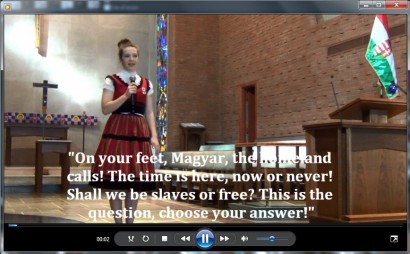
[Watch the 2014 video on
AHF's YouTube Channel]
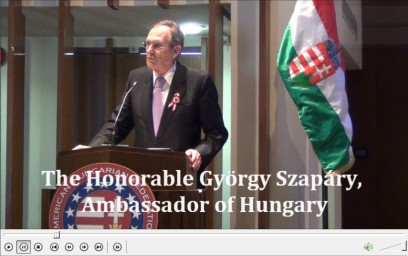
[Watch the 2014 video on
AHF's YouTube Channel]
Shortcuts:
Downloads:
Famous Quotes
 "The house of Habsburg-Lorraine, perjured in the sight of
God and man, had forfeited the Hungarian throne." "The house of Habsburg-Lorraine, perjured in the sight of
God and man, had forfeited the Hungarian throne."
Hungary, April 1849
"All for the people and all by the people. Nothing about
the people without the people. That is Democracy, and that is the ruling
tendency of the spirit of our age."
Spoken before the Ohio State Legislature,
February 16, 1852
About Louis
Kossuth
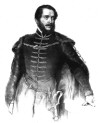 Kossuth
Lajos (b. 1802, d. 1894, pronounced co-shoot luh-yôsh) was Governor of Hungary during fight for independence and democracy which
was eventually defeated by the union of the royalist Austrian Habsburg
and Russian Czarist Armies (1848 - 1849). Kossuth envisioned a federation
in the Kingdom of Hungary in which all nationalties participated in a
vibrant democratic system based on fundamental democratic principles such
as equality and parliamentary representation. The bloody conflict eventually
led to a great compromise known as the "Austro-Hungarian Empire,"
in which Hungary gained some autonomy. although Kossuth would have no
part in it and demanded full indepependence until his death. Kossuth
Lajos (b. 1802, d. 1894, pronounced co-shoot luh-yôsh) was Governor of Hungary during fight for independence and democracy which
was eventually defeated by the union of the royalist Austrian Habsburg
and Russian Czarist Armies (1848 - 1849). Kossuth envisioned a federation
in the Kingdom of Hungary in which all nationalties participated in a
vibrant democratic system based on fundamental democratic principles such
as equality and parliamentary representation. The bloody conflict eventually
led to a great compromise known as the "Austro-Hungarian Empire,"
in which Hungary gained some autonomy. although Kossuth would have no
part in it and demanded full indepependence until his death.
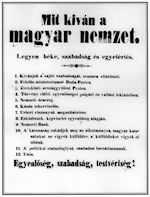 The speech from which the above excerpt is taken was given over a decade
before Lincoln's famed "for the people, by the people" speech
given at Gettysburg in 1863. Kossuth was the first foreign Statesman officially
invited to the US since the Marquis de Lafayette. His upcoming speech
in the Congress of the United States made the pre-civil war joint house
nervous due to his democratic views on equality of all men. Kossuth learned
English while in prison and exile and spoke to half the population of
the US who enthusiastically greeted and flocked to hear him. Despite Hungary's
epic struggle and Kossuth's brave and noble efforts, the US, the "Bastion
of Democracy" turned him away, empty handed. Hungary was alone again
in its fight for democracy in 1956, and didn't gain freedom until 1989 and would soon join NATO. The speech from which the above excerpt is taken was given over a decade
before Lincoln's famed "for the people, by the people" speech
given at Gettysburg in 1863. Kossuth was the first foreign Statesman officially
invited to the US since the Marquis de Lafayette. His upcoming speech
in the Congress of the United States made the pre-civil war joint house
nervous due to his democratic views on equality of all men. Kossuth learned
English while in prison and exile and spoke to half the population of
the US who enthusiastically greeted and flocked to hear him. Despite Hungary's
epic struggle and Kossuth's brave and noble efforts, the US, the "Bastion
of Democracy" turned him away, empty handed. Hungary was alone again
in its fight for democracy in 1956, and didn't gain freedom until 1989 and would soon join NATO.
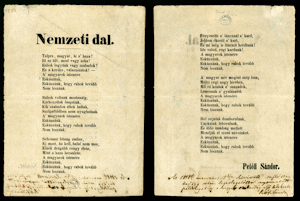 Today, there are many reminders of Kossuth's impact on America and the
world. In North America, there is a Kossuth County in the state of Iowa,
a town with his name in Indiana, Ohio and Mississippi,
a settlement with a Kossuth Post Office is in Pennsylvania. In addition,
there are Kossuth statues and plaques in New York, Cleveland, Akron, New
Orleans, Washington, and Ontario, Canada. The Hungarian
Reformed Federation's building on Dupont Circle, in Washington, DC
is called Kossuth House with a memorial plaque commemorating his speech
on democracy. See the picture gallery and memorials on Louis
Kossuth in North America. Today, there are many reminders of Kossuth's impact on America and the
world. In North America, there is a Kossuth County in the state of Iowa,
a town with his name in Indiana, Ohio and Mississippi,
a settlement with a Kossuth Post Office is in Pennsylvania. In addition,
there are Kossuth statues and plaques in New York, Cleveland, Akron, New
Orleans, Washington, and Ontario, Canada. The Hungarian
Reformed Federation's building on Dupont Circle, in Washington, DC
is called Kossuth House with a memorial plaque commemorating his speech
on democracy. See the picture gallery and memorials on Louis
Kossuth in North America.
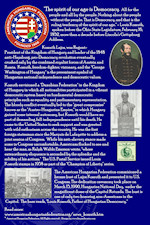
AHF presents a gift to to the American People: The Kossuth Bust in the US Capitol [read more]
|
The renowned Ralph Waldo Emerson said in greeting Kossuth on his arrival
at Concord, MA, May 11, 1852:
"[we] have been hungry to see the man whose extraordinary eloquence
is seconded by the splendor and the solidity of his actions."
Kossuth was greeted with wild enthusiasm across the country. He was only
the second foreign leader (second to Lafayette) to address a joint session
of Congress.
The American Hungarian Federation dedicated a bust that now sits proudly in the US Capitol - it reads, "Louis
Kossuth, Father of Hungarian Democracy" [read more]
Audio
Resources
 Hear
Louis Kossuth Speak! [Click Here] - This is the speech of Louis Kossuth which he gave for the dedication of the statue for the 13 Hungarian generals, who were executed at Arad, Hungary, on October 6, 1849 (Arad is in Rumania today after annexation due to the Treaty of Trianon in 1920 ).
Louis Kossuth was exiled after the fall of the Hungarian Liberation Fight of 1848 and made his permanent home in Torino (Turin), Italy. He could not attend the dedication of the monument at Arad, without risking arrest, so he recorded his speech inTurin, and sent it to Arad using the new technology of sound recording, called the phonograph. Hear
Louis Kossuth Speak! [Click Here] - This is the speech of Louis Kossuth which he gave for the dedication of the statue for the 13 Hungarian generals, who were executed at Arad, Hungary, on October 6, 1849 (Arad is in Rumania today after annexation due to the Treaty of Trianon in 1920 ).
Louis Kossuth was exiled after the fall of the Hungarian Liberation Fight of 1848 and made his permanent home in Torino (Turin), Italy. He could not attend the dedication of the monument at Arad, without risking arrest, so he recorded his speech inTurin, and sent it to Arad using the new technology of sound recording, called the phonograph.
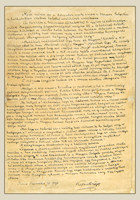 The recording was made on September 20, 1890, when Kossuth was 88 years old. It is a sad fact that the monument Kossuth sent his speech for was torn down by the Rumanian government when they annexed Transylvania, along with Arad, in 1920, after World War I. The recording was made on September 20, 1890, when Kossuth was 88 years old. It is a sad fact that the monument Kossuth sent his speech for was torn down by the Rumanian government when they annexed Transylvania, along with Arad, in 1920, after World War I.
The original
recording on two wax cylinders for the Edison phonograph survives to this
day, although barely audible due to excess playback and unsuccessful early
restoration attempts. Lajos Kossuth is the earliest born person
in the world who has his voice preserved. Since the audio
is of such poor quality, here is it is transcribed in Hungarian and translated
to English (special thanks to Louis
Kossuth in North America)
Hungarian |
English |
"A világ bírája
a történelem fog e kérdésre felelni. Legyenek
a szentemlékû vértanúk megáldottak
poraikban, szellemeikben a hon szabadság Istenének
legjobb áldásaival az örökkévalóságon
keresztül; engem ki nem borulhatok le a Magyar Golgota porába,
engem október 6-a térdeimre borulva fog hontalanságom
remete lakában látni a mint az engem kitagadott Haza
felé nyújtva agg karjaimat a hála hû
érzelmeivel áldom a vértanúk szent emlékét
hûségükért a Haza iránt, 's a magasztos
példáért, melyet az utódoknak adtanak;
's buzgó imával kérem a magyarok Istenét,
hogy tegye diadalmassá a velõkig ható szózatot,
mely Hungária ajkairól a Magyar Nemzethez zeng. Úgy
legyen Ámen!
Turin
September 20 1890
Kossuth Lajos |
"The judge of the universe,
history, will decide over this question. Should the saintly remembered
martyrs be hallowed in their ashes, in their spirit with the highest
blessings of the Lord of Liberty and through eternity; I can not
pay my sympathies to the ashes of the Hungarian Golgotha, but October
6 will find me on my knees in this reclusive home of exile, as I
open my arms to my disowning homeland. With gratitude's faithful
sentiments, I bless the martyrs' sacred memory for their faith in
their homeland and for the sublime example they left to their heirs:
with ardent prayer I beg the God of Hungarians to make their appeal
which echoes from the lips of Hungaria to the Hungarian Nation.
So be it, Amen!
Turin
September 20 1890
Lajos Kossuth |
|
Click to hear the recording: |
"Kossuth Lajos azt üzente,
elfogyott a regimentje.
Ha még egyszer azt üzeni,
mindnyájunknak el kell menni,
Éljen a magyar szabadság,
Éljen a haza ! |
Esik esõ karikára,
Kossuth Lajos kalapjára.
Valahány csepp esik rája,
Annyi áldás szálljon rája,
Éljen a magyar szabadság,
Éljen a haza!" |
Links
- AHF and the Kossuth Bust in the US Capitol
- AHF commemorating 1848
- President Bush Honors 1848 and Hungary's Contributions to Democracy
- HRFA's excellent Kossuth in America [visit]
- Select Speeches of Kossuth, Condensed and Abridged, with Kossuth's
Express Sanction [visit]
- Louis Kossuth, Mason And Apostle Of World Democracy [visit]
- Count Apponyi's Oration on the Death of Louis Kossuth [visit]
- Wikipedia - [visit]
and add your thoughts!
- Louis Kossuth in North America [visit]
- Kossuth County, Iowa [visit]
- Kossuth County, Iowa statue dedication
[visit]
- Dedication of statue to replace one destroyed by
Rumanian occupation
forces in 1921:
Gyergyócsomafalva, Transylvania [visit]
|




